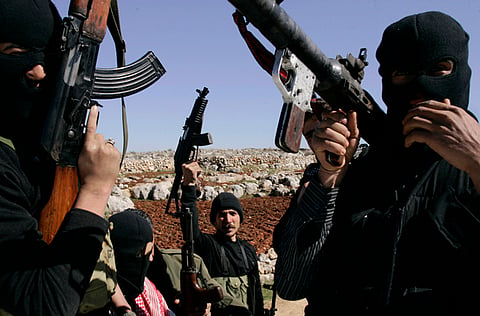Western spies helping Syria rebels
British and German spies are helping Syrian rebels launch successful attacks: report

Aleppo: British and German spies are involved in covert operations to help Syrian rebels in their increasingly bloody fight to topple the regime of President Bashar Al Assad, press reports said on Sunday.
The reports said German and British spies were passing on information about Syrian troop movements to the rebels.
“We can be proud of the significant contribution we are making to the fall of the [Al] Assad regime,” an official from Germany’s BND foreign intelligence service told Bild am Sonntag.
The paper said German spies were stationed off the Syrian coast and also active at a Nato base in Turkey, whose government is staunchly opposed to the Al Assad regime and is sheltering Free Syrian Army rebels.
Britain’s Sunday Times newsaper also said British intelligence was helping rebels launch successful attacks on government forces with information gathered from their listening posts in nearby Cyprus.
It said the most valuable intelligence has been about the movements of troops towards the flashpoint commercial hub of Aleppo, which is now partly controlled by rebels and is the scene of some of the fiercest fighting.
The regime’s far superior military might has failed to suppress the poorly armed rebels whose determination to bring Al Assad down has only grown with the passing of time.
Overall the death toll has surged to at least 23,000 people since March last year, the Observatory says, while the UN puts the toll at 17,000.
With the bloodletting showing no signs of abating, the opposition lashed out at new envoy Brahimi, branding as “unacceptable” his reported comments that it was too soon for him to call for Al Assad to go.
Brahimi’s comments only served to give Al Assad’s government a “licence to kill tens of thousands more Syrians”, the Syrian National Council said in a statement.
The West is demanding Al Assad step down as part of any political deal to end the 17-month conflict but is opposed by Syria’s traditional allies in Moscow and Beijing which see it as foreign-imposed regime change.
Brahimi, who replaced Kofi Annan, nevertheless won support from the West as well as China and Russia, although the White House said it would be seeking clarifications on the terms of his mandate.
With Western speculation of further defections, Syrian state television insisted that Vice-President Farouq Al Shar’a had not left the country after opposition and media reports that he had defected.
“Mr [Al] Shar’a has never thought about leaving the country or going anywhere,” the television said on Saturday, quoting a statement from his office.
Al Shar’a, 73, is the most powerful Sunni Muslim figure in the minority Alawite-led regime and has served in top posts for almost 30 years.
A former deputy oil minister who defected in March said Al Shar’a was actually under house arrest and that other top officials were also being kept under surveillance.
“He has been trying to leave Syria,” Abd Hussam Al Deen told Al Arabiya television. “But there are a series of circumstances that prevent him from leaving, especially the fact that he has been under house arrest for some time.”
Among those to have abandoned the embattled regime are former prime minister Riyad Hijab and high profile general Manaf Tlass — a childhood friend of Al Assad.
Meanwhile, UN observers were preparing to wrap up their mission on Sunday after chief observer General Babacar Gaye accused both sides of failing to protect civilians.
“Both parties have obligations under international humanitarian law to make sure that civilians are protected,” Gaye told reporters in Damascus ahead of the mission’s end at midnight on Sunday. “These obligations have not been respected.”
The UN originally sent in 300 unarmed military observers in April but its patrols were suspended in June because of the mounting violence.
As Muslims the world over marked Eid, Syrians faced another daily cycle of bloodshed.
Troops bombarded the besieged city of Rastan in the central province of Homs, as well as Idlib in the northwest and the eastern province of Deir Al zor, the Observatory said.
“This is how we celebrate Eid!” chanted a crowd of protesters — among them children — who took to the streets of Kafr Zeita, in the central province of Hama, according to amateur video posted on YouTube by activists.
The intensified fighting has sent at least 170,000 Syrians fleeing while another 2.5 million inside Syria need aid, according to the UN.
Sign up for the Daily Briefing
Get the latest news and updates straight to your inbox


